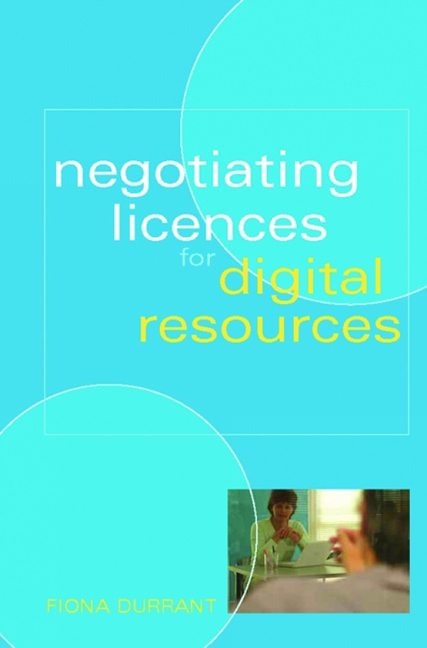Book contents
- Frontmatter
- Contents
- Acknowledgements
- Introduction
- 1 Preparation
- 2 The contract
- 3 Negotiation
- 4 Staff development and communicating negotiation outcome
- 5 Conclusion
- References and further reading
- Appendix 1 Frequently asked questions
- Appendix 2 Negotiation timeline
- Appendix 3 Personal negotiation experience
- Index
- Frontmatter
- Contents
- Acknowledgements
- Introduction
- 1 Preparation
- 2 The contract
- 3 Negotiation
- 4 Staff development and communicating negotiation outcome
- 5 Conclusion
- References and further reading
- Appendix 1 Frequently asked questions
- Appendix 2 Negotiation timeline
- Appendix 3 Personal negotiation experience
- Index
Summary
This chapter cannot offer legal advice or interpretation as the author is not a lawyer.
The purpose of this chapter is to make the subscribing negotiator feel more comfortable about the contract, to examine what are the key sections of the contract and to explain some of the jargon. It also aims to emphasize that money is only one aspect of the negotiation process. It may also prove useful to a publisher or representative who is familiar with sales but new to dealing with contracts for electronic resources.
Depending on the size of the publisher, they may have their own inhouse legal team to draft the contract. Some smaller publishers may have paid an outside firm to compile the contract. Being aware of this can help the subscribing organization understand how easy it would be for the publisher to amend the terms of the contract if that were what was needed. Some organizations prefer to use standard contracts for all their products, ranging from software and outsourced cleaning contracts to plant maintenance and online subscriptions.
Often the contract does not need any alterations to suit the particular needs of the subscribing organization, but sometimes a few tweaks are desirable, if only to seek clarification. There is no need to make the exploration of contract issues any more complicated than it needs to be. Often the addendum to the contract of an e-mail communication between the organization and the representative is sufficient.
The aims of the contract
A contract is put in place to protect the interests of the publisher, the content owner and the purchaser. It is a document that clearly sets out what is allowed and what are the obligations of all parties concerned. To the inexperienced negotiator contracts might appear to be designed to baffle and confuse, although this is rarely their intention. Some contracts have won awards for the clarity of their wording; unfortunately many have not. The contract is a legal document and it usually mentions under which jurisdiction it falls should there be any disputes. Disputes are rare, and by ironing out any queries, misunderstandings or poor drafting, disputes will be highly unlikely.
- Type
- Chapter
- Information
- Negotiating Licences for Digital Resources , pp. 37 - 60Publisher: FacetPrint publication year: 2006

